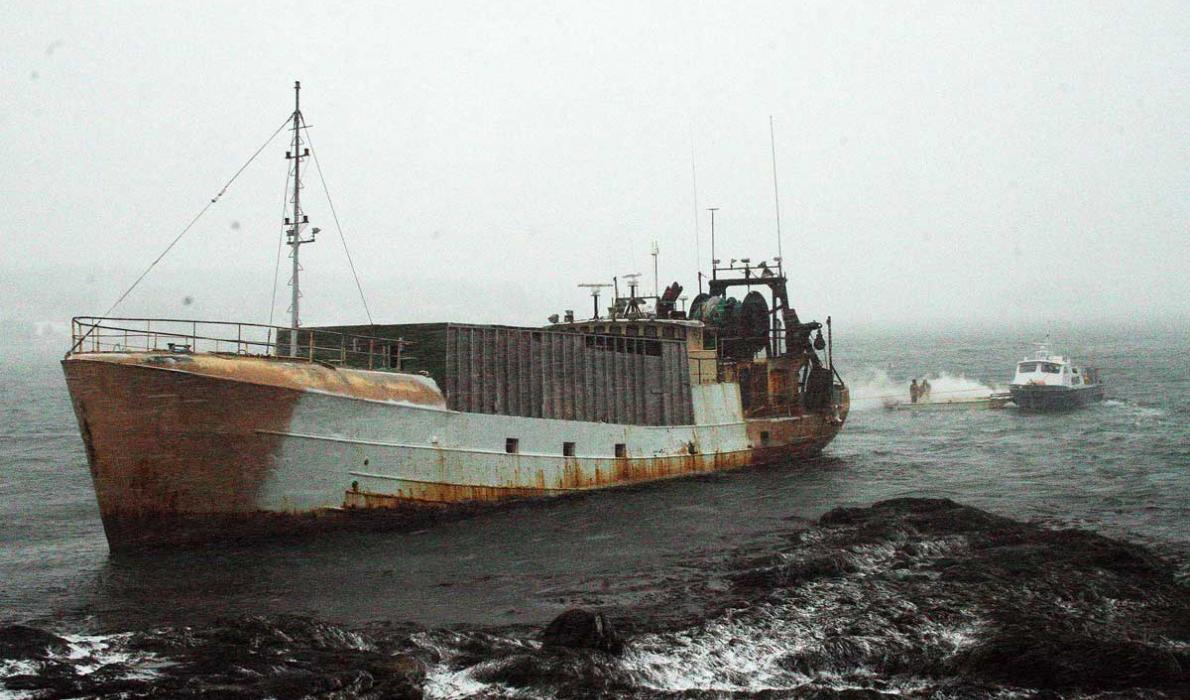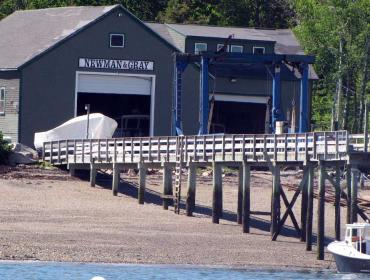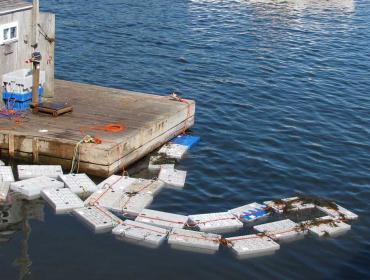Posted March 11, 2015
Last modified June 15, 2015
Compiled by Tom Groening
In baseball, the hitter gets three strikes. But when it comes to a 136-foot fishing boat wandering off it's mooring, there is no third strike.
The Boothbay Register has been following the saga of the Westward, a steel-hulled, Dutch-built vessel that has been moored in Boothbay Harbor since 2012.
In high winds on Jan. 9, the vessel broke loose from a mooring at Boothbay Harbor Shipyard, the paper reported and ran aground. The boat was towed off the rocks and secured on a Coast Guard mooring.
The paper reports that this was the second time in two years the boat went for a "walkabout." The owner of the vessel told the Register he hoped to have it repaired and back fishing by last summer, but that has not come to fruition.
After the Jan. 9 mishap, the boat was to be moved to Portland, the paper reported. The Westward's sister ship, Columbia, moored in nearby Bristol harbor, and also has caused problems when it has drifted away from its mooring.
* * *
The York County Coast Star reported in early March that the Department of Transportation has begun work on a $13.5 million project to rebuild U.S. Route 1 in Ogunquit. The work would include rebuilding the roadway, two bridges and giving "the village a facelift," the paper reported. The work will break on June 18 through Labor Day to accommodate summer business, then continue and wrap up in 2016.
The paper notes that Ogunquit swells from a year-round population of 3,500 to 35,000 in summer.
* * *
Coastal property owners in Hancock County have been granted a sort of stay of execution by the Federal Emergency Management Agency. The Island Ad-Vantages newspaper in Stonington reports that FEMA has fielded so many appeals of its new floodplain maps from Hancock County towns that it has delayed implementation until 2016.
The maps identify areas vulnerable to coastal flooding from storms and unusually high tides, and raise insurance rates or, in some cases, deny insurance.
* * *
More on Stonington and its neighboring municipality, Deer Isle: the Jan. 22 Island Ad-Vantages featured a column by Bill Haviland recounting the rivalry between the two towns.
Haviland writes that Deer Isle was settled first, because Green's Landing—today's Stonington—was too rocky and sandy to support farming. It wasn't until the granite business took off after the Civil War that Stonington began to boom.
Putting the rivalry in historical context, Haviland makes the case that it was short-lived. Today, the two communities share a high school and other public institutions.
* * *
South Portland's waterfront will get attention from a new city committee, the website KeepMECurrent reports.
"It's been nearly 20 years since there has been focused oversight of waterfront activities," the news site notes, which is why the council "is considering creating a new waterfront advisory committee that would have the primary responsibility for making recommendations regarding land use, management and preservation along the shoreline."
Councilors say there are underutilized parts of the waterfront and they want to focus on developing more tourism there.
* * *
Canada is continuing its promotion campaign for lobster, we learned by reading The Quoddy Tides newspaper. A story out of Grand Manan reports that the Lobster Council of Canada provided islanders there with information "on its generic marketing strategy for 'the best lobster in the world.' A new logo has been created, and a one-cent-per-pound levy from both fishers and buyers will be matched by federal funding to create brand awareness across Canada and around the world."
One wonders how much of that lobster was caught in Maine waters.

Contributed by




